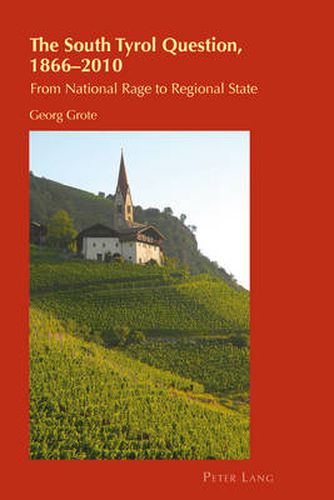Readings Newsletter
Become a Readings Member to make your shopping experience even easier.
Sign in or sign up for free!
You’re not far away from qualifying for FREE standard shipping within Australia
You’ve qualified for FREE standard shipping within Australia
The cart is loading…






This title is printed to order. This book may have been self-published. If so, we cannot guarantee the quality of the content. In the main most books will have gone through the editing process however some may not. We therefore suggest that you be aware of this before ordering this book. If in doubt check either the author or publisher’s details as we are unable to accept any returns unless they are faulty. Please contact us if you have any questions.
South Tyrol is a small, mountainous area located in the central Alps. Despite its modest geographical size, it has come to represent a success story in the protection of ethnic minorities in Europe. When Austrian South Tyrol was given to Italy in 1919, about 200,000 German and Ladin speakers became Italian citizens overnight. Despite Italy’s attempts to Italianize the South Tyroleans, especially during the Fascist era from 1922 to 1943, they sought to maintain their traditions and language, culminating in violence in the 1960s. In 1972 South Tyrol finally gained geographical and cultural autonomy from Italy, leading to the ‘regional state’ of 2010.
This book, drawing on the latest research in Italian and German, provides a fresh analysis of this dynamic and turbulent period of South Tyrolean and European history. The author provides new insights into the political and cultural evolution of the understanding of the region and the definition of its role within the European framework. In a broader sense, the study also analyses the shift in paradigms from historical nationalism to modern regionalism against the backdrop of European, global, national and local historical developments as well as the shaping of the distinct identities of its multilingual and multi-ethnic population.
$9.00 standard shipping within Australia
FREE standard shipping within Australia for orders over $100.00
Express & International shipping calculated at checkout
This title is printed to order. This book may have been self-published. If so, we cannot guarantee the quality of the content. In the main most books will have gone through the editing process however some may not. We therefore suggest that you be aware of this before ordering this book. If in doubt check either the author or publisher’s details as we are unable to accept any returns unless they are faulty. Please contact us if you have any questions.
South Tyrol is a small, mountainous area located in the central Alps. Despite its modest geographical size, it has come to represent a success story in the protection of ethnic minorities in Europe. When Austrian South Tyrol was given to Italy in 1919, about 200,000 German and Ladin speakers became Italian citizens overnight. Despite Italy’s attempts to Italianize the South Tyroleans, especially during the Fascist era from 1922 to 1943, they sought to maintain their traditions and language, culminating in violence in the 1960s. In 1972 South Tyrol finally gained geographical and cultural autonomy from Italy, leading to the ‘regional state’ of 2010.
This book, drawing on the latest research in Italian and German, provides a fresh analysis of this dynamic and turbulent period of South Tyrolean and European history. The author provides new insights into the political and cultural evolution of the understanding of the region and the definition of its role within the European framework. In a broader sense, the study also analyses the shift in paradigms from historical nationalism to modern regionalism against the backdrop of European, global, national and local historical developments as well as the shaping of the distinct identities of its multilingual and multi-ethnic population.